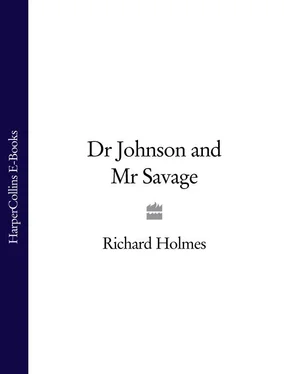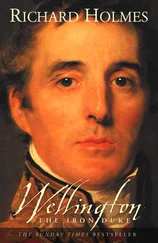Johnson was not interested in what a modern biographer would call ‘research’. He did not even attempt to investigate the circumstances of Savage’s birth, or walk over to St Andrew’s, Holborn, to examine Savage’s baptismal register. (Years later it was Boswell who meticulously did all this.) He relied almost solely on the books, papers and magazine articles which Edward Cave could supply from the Gentleman’s Magazine archives.
In September 1743 Johnson was working in haste, in poverty, and under the very Grub Street conditions that Savage himself had so often experienced. An undated note to Cave, from Johnson’s rooms in Castle Street, gives a vivid glimpse of the harassed young biographer preparing his materials and estimating his rate of production against his financial reserves.
… The Life of Savage I am ready to go upon, and in great Primer and Pica Notes reckon on sending in half an Sheet a day, but the money for that shall likewise lie in your hands till it is done. With the [Parliamentary] Debates shall I not have business enough? – If I had but good Pens. – Towards Mr Savage’s Life what more have you got? I would willingly have [the text of] his Trial etc, and know whether his Defence be at Bristol; and would have his Collection of Poems [1726] on account of the Preface. – The Plain Dealer [articles] – All the Magazines that have anything of his or relating to him.
Johnson’s postscript to this letter is expressive. He has no candles, and Cave’s printer’s boy ‘found me writing this, almost in the dark’. Cave had also asked for a preliminary epitaph on Savage, to be printed in the forthcoming issue. But Johnson has been ill, and is late producing it. ‘I had no notion of having any thing for the [Savage] Inscription, I hope You don’t think I kept it to extort a price. I could think on Nothing till today. If You could spare me another Guinea … I should take it very kindly tonight, but if You do not shall not think it an injury. – I am almost well again.’ 1
Because of these conditions, it is invariably thought that Johnson wrote the biography very fast, ‘at white heat’, and largely from memory. It is taken as a sort of spontaneous effusion of friendship; and its surprising romanticism, and many errors and omissions, are easily explained away on these grounds. Boswell was partly responsible for this conventional view, for though he greatly admired the ‘strong and affecting’ narrative, he thought its evident ‘partiality’ might reasonably be excused by haste of composition. During their tour of the Hebrides, thirty years later, he reported Johnson as saying that he wrote ‘forty-eight of the printed octavo pages at a sitting, but then I sat up all night’. 2
If true, this would have been about a quarter of the book in a twenty-four-hour period, and the whole Life in less than a week. In fact Johnson took about three months compiling and expanding the biography, between mid-September and 14th December 1743, when he signed a receipt for fifteen guineas for passing the completed manuscript to Cave. By Johnson’s standards this was a leisurely and reflective pace of production. 3
It is clear from the typographical evidence of the book’s printing that the epic all-night sitting refers to a single period of rewriting , later in January 1744. Working against a printer’s deadline, Johnson recast the final section with new materials about Savage’s death, and the last forty-eight pages were reset. 4 This rewriting session further delayed the book’s publication until February 1744, some five months after he had started. It is characteristic of the unusual care which Johnson lavished on the whole manuscript, and which forced Cave – who was acting as his editor – to delay what had been originally intended as a piece of instant, topical journalism by the publisher Roberts.
Nor did Johnson compose haphazardly, from memory or a loose collection of personal reminiscences. Many things that he said subsequently about biography might suggest this. Johnson had later insisted to Boswell that true biographical knowledge could only grow out of close companionship: ‘nobody can write the life of a man, but those who have eat and drunk and lived in social inter-course with him.’ 5 Reflecting on the biographical process, in The Rambler , no. 60, Johnson also emphasised the need for intimacy, in an aphorism that became famous. ‘… More knowledge may be gained of a man’s real character by a short conversation with one of his servants, than from a formal and studied narrative, begun with his pedigree and ended with his funeral.’ 6
Savage of course had never had a servant, and the absence of a domestic menage of any kind, except for those temporarily borrowed (and quickly alienated) from other households such as Lord Tyrconnel’s, posed its own peculiar mystery round his unusual solitude, which Johnson had to penetrate.
The value of personal witness, of small impressions and trivial incidents, of recent memories and vivid anecdotes, however fleeting and partial they might be, was defended by Johnson as essential to biography. ‘… Most accounts of particular persons are barren and useless. If a Life be delayed till interest and envy are at an end, we may hope for impartiality, but we must expect little intelligence; for the incidents that give excellence to biography are of a volatile and evanescent kind, such as soon escape the memory, and are rarely transmitted by tradition.’ 7
This might have been written with his Life of Savage specifically in mind; and such ‘volatile’ impressions, recalling their friendship with rueful tenderness, streamed easily from Johnson’s pen once he began to write. Savage’s innocent, almost childlike vanity as an author produces one such typical incident. ‘He could not easily leave off when he had once begun to mention himself or his Works, nor ever read his Verses without stealing his Eyes from the Page, to discover in the Faces of his Audience, how they were affected with any favourite Passage.’ 8
Yet Johnson has removed himself from this moment, just as he did in the great description of the night-walking. His personal presence, as Savage’s friend, is absorbed in the anonymity of ‘the Faces of his Audience’. The witness, the friend, is absent. This remains true almost throughout the Life : though intensely personal and partial, its narrative voice appears distanced and carefully withdrawn. This makes Johnson’s attitude, and the level of his irony, peculiarly difficult to judge.
Indeed Johnson based the opening section of his story on something quite different from the personal impressions and interviews with friends that a modern biographer might expect. In fact what he did was so unexpected that it was overlooked by many commentators (though not by Boswell). For the first half of Savage’s life, up to the trial for murder of 1727 at least, Johnson simply used a previous biography.
This was a twenty-nine-page booklet, issued anonymously by the ‘bookseller J. Roberts’ in December 1727, entitled The Life of Mr Richard Savage…Who was Condemned … the last Sessions at the Old Bailey, For Murder…With some very remarkable Circumstances relating to the Birth and Education, of that Gentleman, which were never before made publick. Johnson followed its storyline paragraph by paragraph, adding his own commentary and occasional new facts or corrections.
The booklet is a defence of Savage, intended to save him from the gallows. It was published, significantly, by the same James Roberts who commissioned Johnson’s work. Johnson assumed its information was taken direct from Savage, during a series of interviews in the condemned cells at Newgate Prison. But a contemporary letter from Savage in Newgate suggests this was not strictly so, and he certainly contradicted some of the booklet’s facts later.
Читать дальше












